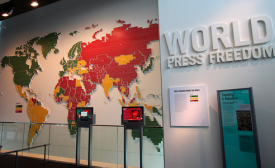foreign policy
Stunned by Russia's swift move into the autonomous province of Crimea and the Russian parliament's endorsement of that brazen action, the United States called on Moscow to withdraw its forces from the region and "refrain from any interference elsewhere in Ukraine." Speaking by phone with Russian President Vladimir Putin for the first time since this crisis escalated, President Obama expressed concern over "Russia's clear violation of Ukrainian sovereignty and territorial integrity," according to a White House statement.
Dmitry Fedorovich Mezentsev, Secretary-General of the Shanghai Cooperation Organisation(SCO), visited New Delhi on a two day visit from February 23 to 25. The visit failed to attract any meaningful media attention. Nonetheless, the visit is significant and highlights the importance of the SCO in India’s larger relations with Central Asia and South Asia.

Among the principal assets of U.S. public diplomacy are American values. They are admired around the world, even by many people who dislike American policy. No other political system offers such extensive individual and systemic freedoms as those enumerated in the Bill of Rights. Showcasing and standing up for those freedoms should be at the heart of U.S. public diplomacy.
Ukraine's new interim President Oleksandr Turchynov has said the country will focus on closer integration with the EU. Mr Turchynov was appointed following the dismissal of President Viktor Yanukovych by MPs on Saturday. Mr Yanukovych's rejection of an EU-Ukraine trade pact triggered the protests that toppled him. The interim president also said he was "ready for dialogue" with Russia, which has backed Mr Yanukovych.
With Ukraine's parliament dismantling the last vestiges of ousted President Viktor Yanukovych's government, the Obama administration warned Russia against sending troops into the country and told Moscow that it should allow Ukrainians to freely determine their own future. Appearing on Meet the Press Sunday, National Security Advisor Susan Rice was adamant about limiting Russia's role in Ukraine going forward.
Not long ago, China was a soft-power juggernaut. Media accounts highlighted Chinese leaders’ thoughtful forays abroad, depicting policymakers that were respectful of others’ opinions, willing to listen, humble to a fault, and reluctant to dispense unsolicited advice. Here was a country that was content to allow its own example of success to speak for itself.
Soft power proponents tend to forget that the purpose of soft power, as with public diplomacy more broadly, is to advance the strategic interests of your country. The goal is not be “nice” or transiently popular, but to advance toward your foreign policy goals. Public diplomats are not social workers, and they should not allow themselves to be seen as such.
Soft power proponents tend to forget that the purpose of soft power, as with public diplomacy more broadly, is to advance the strategic interests of your country. The goal is not be “nice” or transiently popular, but to advance toward your foreign policy goals. Public diplomats are not social workers, and they should not allow themselves to be seen as such.







